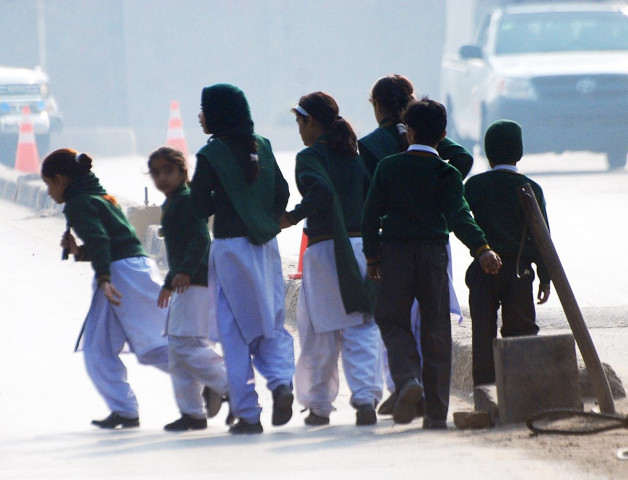Disaster management: Students get training for emergencies
Authorities working on outline of a plan to tackle impacts of climate change

.PHOTO: REUTERS
NDMA Member Administration, Raheela Saad said the authority has decided to scale up the School Safety Programme at the Islamabad Capital Territory (ICT) level as a model pilot project owing to its monumental success and approval of the framework by Prime Minister of Pakistan, Gender and Child Cell (GCC). Currently the project is in the second phase of implementation, she added. NDMA unveiled its flagship project on the commemorating ceremony of the first National Resilience Day.
The main purpose of the Pakistan School Safety Framework is to provide policy guidance and to set a standard for the implementation of comprehensive school safety guidelines at national, provincial, district and school levels. PSSF was developed after a series of National level consultative meetings with the government and private sector stakeholders, Saad added.
The final consensus, she said was developed in the last National Consultative Meeting in August, 2016, where it was recommended that the said framework should be pre-tested through a pilot project and its findings should be reviewed to refine the framework, before its implementation.
Saad added, "The PSSF Framework was pre-tested through a pilot project in 68 selected government and private schools across Pakistan, Azad Jammu and Kashmir (AJK) and Gilgit- Baltistan (G-B), with the aim to determine the applicability challenges of the framework and view its effectiveness in disaster risk management, in the education sector at national and regional levels." The PSSF pilot broadly comprised of four phases, she informed, in Phase-I a core group of 25 members would be trained as master trainers and quality supervisors, in Phase-II a set of three teachers from each of the nominated schools were trained on the School Safety Framework as School Safety Teachers whereas total 209 teachers were trained. Member Administration NDMA added that under Phase-III of the pilot project implementation of the PSSF in respective schools was conducted whereas in Phase-IV 29 evaluators were trained. The team of evaluators comprised of district departments of education, building, fire and police, along with representatives of the NDMA and Provincial Disaster Management Authorities (PDMAs).
To a question, Saad said, "234 participants (master trainers and school teachers) and 29 evaluators (fire brigade, police, 1122, civil defense, building department, education departments) were trained across Pakistan on PSSF.
The pilot project trained around 55,000 children from government and private schools. The Pilot Programme was successfully concluded by February 28, 2017," she informed. To another query she replied, "Evaluation results of the PSSF pilot revealed that the general safety standards of schools, were found barely satisfactory, thus highlighting the need for school safety as a matter of immediate concern in the provinces." She added that at present, discussions and meetings are underway for initiating pilot project in 30 schools each of Khyber-Pakhtunkhwa (K-P), fomer Federally Administered Tribal Areas (FATA), Balochistan, AJK and G-B.
It is pertinent here that National Disaster Management Commission (NDMC) approved the Pakistan School Safety Framework (PSSF) at the fifth meeting of NDMC, under the chairmanship of the then Prime Minister of Pakistan on March 28, 2018.
The NDMC proposed for efficient roll-out of the PSSF in the provinces since the increased frequency of disasters calls for a higher level of preparedness and institutional response across the country. Replying to another question, she said the National Disaster Management Act 2010 mandates NDMA to develop Guidelines and Standard Operating Procedures (SOPs) for effectively responding to disasters.
The National Disaster Risk Reduction Policy (NDRRP), formulated in 2013, demonstrates Pakistan's commitment to focus on prevention, mitigation and preparedness aspects of disaster risk reduction (DRR). National Education Policy 2009 also defines the role of School Safety and requires policy action in this regard in Section 5.5, Para 105 and Section 6.2, Para 111, she added. "The formulation of PSSF strengthens Pakistan's alliance to the implementation of the Sendai Framework for Disaster Risk Reduction 2015-2030 (SFDRR) that emphasises the significance of incorporating DRR in the education sector.
The framework identifies children as agents of change and highlights child-centered disaster risk management as a high priority agenda," she maintained. Explaining, the significance of the project in line with international disaster management criteria, she said the PSSF directly translates Sendai's Priority Action 1, "Understanding disaster risk" and Priority Action 4" Enhancing preparedness for effective response, and to build back better in recovery, rehabilitation and reconstruction" and Global Target to "Substantially reduce disaster damage to critical infrastructure and disruption of basic services, among them health and educational facilities, including developing their resilience by 2030." She added that Pakistan's strong commitment to adapting the Sustainable Development Goals' (SDG) Agenda in the context of PSSF at the national level also highlights building resilience and reducing vulnerabilities, which are the core aspects across the framework.
"PSSF targets SDG 4, which seeks to ensure inclusive and equitable quality education and promote lifelong-learning opportunities for all and SDG 13, which stresses on urgent action to combat climate change and its impacts," she said, adding that she believed that by honouring the international frameworks, Pakistan intends to pave way for building responsive policies, effective resource allocation and programmes for DRR in schools across the country.
Published in The Express Tribune, October 29th, 2018.


















COMMENTS
Comments are moderated and generally will be posted if they are on-topic and not abusive.
For more information, please see our Comments FAQ